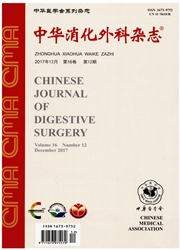

 中文摘要:
中文摘要:
目的 探讨慢病毒介导shRNA沉默STAT3表达对结直肠癌生长的影响.方法 分别用慢病毒干扰质粒pRNAT-shSTAT3、慢病毒空质粒pRNAT-GFP和慢病毒包装质粒混合物共转染293T细胞,获得慢病毒分别感染结直肠癌HT-29细胞,筛选培养后获得HT-29-shSTAT3、HT-29-GFP细胞株.将3种细胞株用于建立裸鼠皮下移植瘤模型,分为3组:第1组为HT-29组,第2组为HT-29-GFP组,第3组为HT-29-shSTAT3组,每组5只.MTT法检测细胞生长情况,流式细胞仪检测细胞周期变化,取瘤组织切片行CD34免疫组织化学观察肿瘤微血管密度(MVD)的变化.应用单因素方差分析检测结果.结果 结直肠癌HT-29、HT-29-GFP细胞株生长能力明显强于HT-29-shSTAT3细胞株,3者比较,差异有统计学意义(F=632.50,P〈0.05).HT-29-shSTAT3细胞株生长明显减慢,G0/G1期细胞占68.7%±2.9%,HT-29-GFP细胞株为38.5%±1.6%,HT-29细胞株为38.7%±2.3%;3者比较,差异有统计学意义(F=166.53,P〈0.05).HT-29组、HT-29-GFP组和HT-29-sh STAT3组MVD分别为29±5、28±4、10±3,3组比较,差异有统计学意义(F=31.60,P〈0.05).结论 慢病毒介导的shRNA沉默STAT3表达能明显抑制结直肠癌的生长.
 英文摘要:
英文摘要:
Objective To determine the effect of signal transducers and activators of transcription 3 (STAT3) gene silencing by shRNA mediated by lentiviral vector for the treatment of colorectal cancer. Methods The recombinant lentiviral vector pRNAT-shSTAT3, empty lentiviral vector pRNAT-GFP, and lentiviral packaging plasmids in supernatant were collected to transfect HT-29 cells for harvesting the HT-29-shSTAT3 cells and HT29-GFP cells. Fifteen male rats were divided into three groups (n = 5 ), and then they were inoculated with HT-29cells, HT-29-GFP cells and HT-29-shSTAT3 cells, respectively. Cell growth was assessed by MTT assay and the changes in cell cycle were detected by flow cytometry. The changes in microvessel density (MVD) of tumors were detected by immunohistochemistry. All data were analysed by one-way analysis of variance. Results The growth of HT-29-shSTAT3 cells was significantly suppressed compared with HT-29 and HT-29-GFP cells (F = 632.50,P 〈 0. 05 ). The proportions of cells at the G0/G1 phase were 68.7% ± 2.9% in HT-29-shSTAT3 cells, 38.5% ±1.6% in HT-29-GFP cells and 38.7% ± 2.3% in HT-29 cells, with a significant difference among the three groups (F = 166.53, P 〈 0.05 ). The MVDs of HT-29 cells, HT-29-GFP cells and HT-29-shSTAT3 cells were 29 ±5, 28 ±4 and 10 ±3, respectively, with a significant difference among the three groups (F=31.60, P 〈0.05). Conclusion STAT3 gene silencing by shRNA mediated by lentiviral vector can significantly inhibit the growth of colorectal cancer cells.
 同期刊论文项目
同期刊论文项目
 同项目期刊论文
同项目期刊论文
 The role of TNF-a and its receptors in the production of β-1,4-galactosyltransferase I mRNA by rat p
The role of TNF-a and its receptors in the production of β-1,4-galactosyltransferase I mRNA by rat p The role of TNF-α and its receptors in the production of Src-suppressed C kinase substrate by rat pr
The role of TNF-α and its receptors in the production of Src-suppressed C kinase substrate by rat pr 期刊信息
期刊信息
